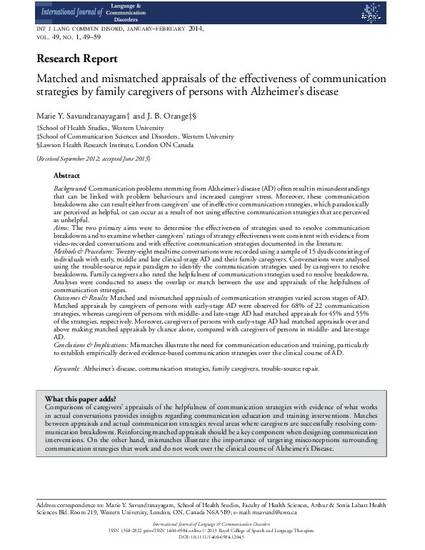
Article
Matched and mismatched appraisals of the effectiveness of communication strategies by family caregivers
International Journal of Language and Communication Disorders
(2014)
Abstract
Background: Communication problems stemming from Alzheimer’s disease (AD) often result in misunderstandings that can be linked with problem behaviours and increased caregiver stress. Moreover, these communication breakdowns also can result either from caregivers’ use of ineffective communication strategies, which paradoxically are perceived as helpful, or can occur as a result of not using effective communication strategies that are perceived as unhelpful.
Aims: The two primary aims were to determine the effectiveness of strategies used to resolve communication
breakdowns and to examine whether caregivers’ ratings of strategy effectiveness were consistent with evidence from video-recorded conversations and with effective communication strategies documented in the literature.
Methods&Procedures: Twenty-eight mealtime conversations were recorded using a sample of 15 dyads consisting of individuals with early, middle and late clinical-stage AD and their family caregivers. Conversations were analysed using the trouble-source repair paradigm to identify the communication strategies used by caregivers to resolve breakdowns. Family caregivers also rated the helpfulness of communication strategies used to resolve breakdowns.
Analyses were conducted to assess the overlap or match between the use and appraisals of the helpfulness of
communication strategies.
Outcomes & Results: Matched and mismatched appraisals of communication strategies varied across stages of AD. Matched appraisals by caregivers of persons with early-stage AD were observed for 68% of 22 communication strategies, whereas caregivers of persons with middle- and late-stage AD had matched appraisals for 45% and 55% of the strategies, respectively.Moreover, caregivers of persons with early-stage AD had matched appraisals over and above making matched appraisals by chance alone, compared with caregivers of persons in middle- and late-stage AD.
Conclusions & Implications:Mismatches illustrate the need for communication education and training, particularly
to establish empirically derived evidence-based communication strategies over the clinical course of AD.
Keywords
- Alzheimer’s disease,
- communication strategies,
- family caregivers,
- trouble-source repair
Disciplines
Publication Date
2014
Citation Information
Marie Y Savundranayagam and Joseph B Orange. "Matched and mismatched appraisals of the effectiveness of communication strategies by family caregivers" International Journal of Language and Communication Disorders (2014) Available at: http://works.bepress.com/marie_savundranayagam/19/
